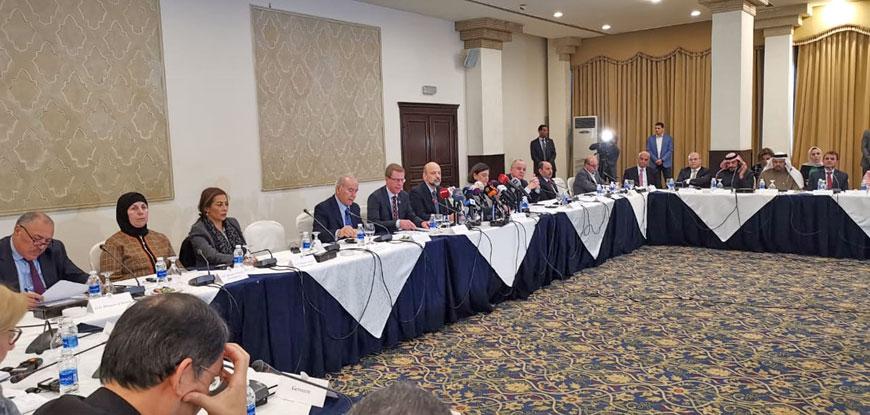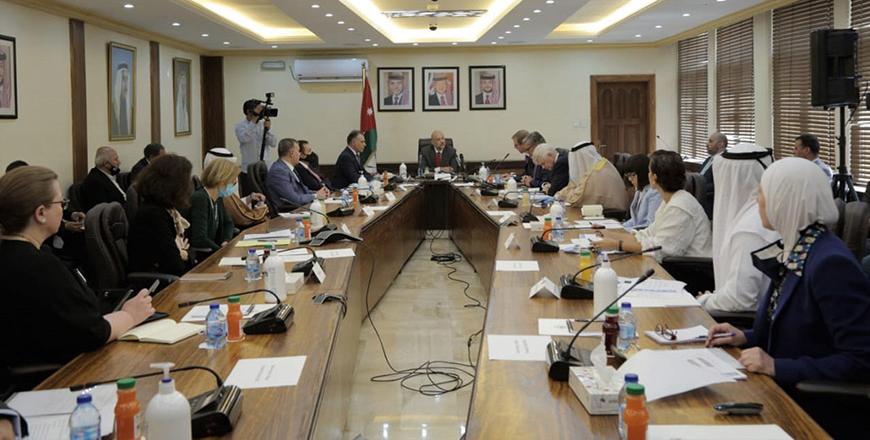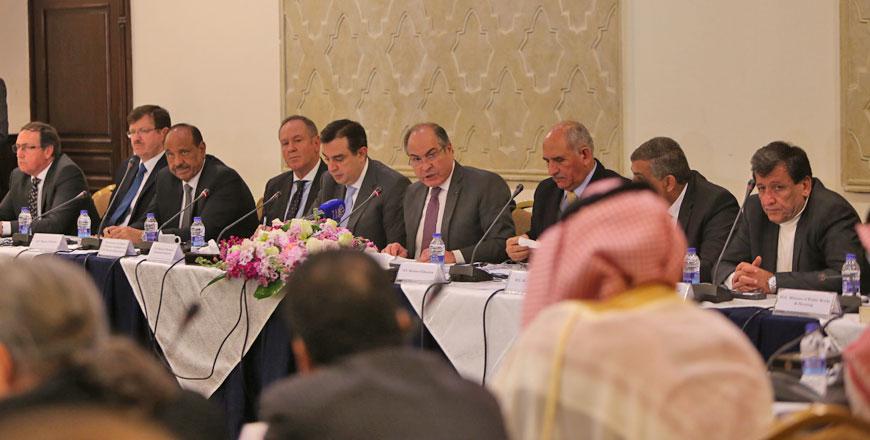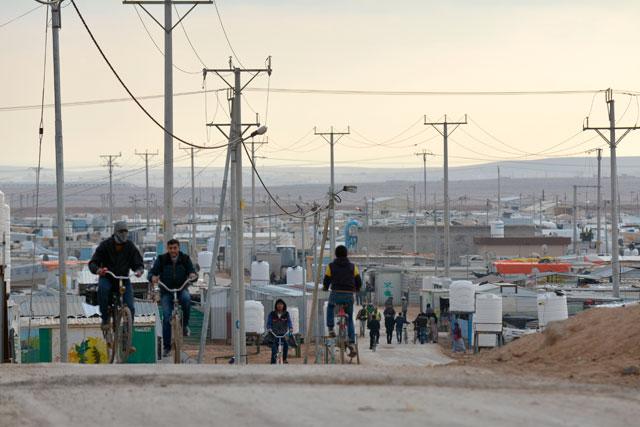You are here
Jordan, int'l community endorse $2.4b response plan to Syria crisis for 2019
By Rana Husseini - Feb 20,2019 - Last updated at Feb 20,2019

Prime Minister Omar Razzaz chairs the 11th meeting to launch the 2019 JRP for the Syria Crisis at Al Hussein Youth City on Wednesday (Petra photo)
AMMAN — Jordan and the international community on Wednesday endorsed a $2.4-billion Jordan Response Platform (JRP) for the Syria Crisis for the year 2019.
Prime Minister Omar Razzaz described the international community’s support as “invaluable”.
“The international community’s support to Jordan in shouldering the impact of the Syrian crisis has helped the country in staying resilient in a very difficult regional setting,” the premier said.
His remarks were made during the 11th meeting to launch the 2019 JRP for the Syria Crisis, held at Al Hussein Youth City and chaired by Razzaz.
Countries that receive and host refugees, often for extended periods, make an immense contribution from their own limited resources to the collective good and, indeed, to the cause of humanity, Razzaz stressed.
It is imperative that these countries obtain the tangible support of the international community as a whole in leading the response, the prime minster added.
Of the funding requirements, $702.9 million is allocated for refugees, while $698.9 million is set to support the resilience of host communities and the remaining $998.2 million is assigned for budget support, the 2019 JRP details.
The Jordan Compact and the relationship between Jordan and the international community is unique in that “it acknowledges the global common good being provided by Jordan in hosting a large number of Syrian refugees despite prevailing national challenges, and the necessity for the international community to support Jordan not only to respond, but also to mitigate impacts to its development”, the premier said.
“The refugee crisis is a test of our character, and we have proven our hospitality and commitments throughout history,” Razzaz stressed.
Razzaz stressed the government’s commitment to meet the future humanitarian needs of refugees.
“Despite the tremendous impact the war in Syria had on Jordan, we have demonstrated our readiness to provide safety and dignified living conditions to hundreds of thousands of refugees fleeing Syria. We will continue doing so and count on your unwavering support as we redouble our efforts to strengthen our resilience,” Razzaz added.
Also addressing the gathering, Minister of Planning and International Cooperation Mary Kawar praised the international community for their “generous contributions and support… that is a vital asset for Jordan to continue with humanitarian and development assistance for both Syrian refugees and vulnerable Jordanians”.
Turning to the 2019 JRP, Kawar explained that it was developed based on the updated findings of the comprehensive vulnerability assessment, including the analysis for the impact of the crisis on key services, namely education, agriculture, health, livelihoods, solid waste management and water.
“As we move towards the ninth year of the Syrian crisis and nine years of Syrian refugees’ plight in Jordan, the aim is to focus on strengthening the national public systems so as to enable them to provide the additional quality services that the Syrians are benefiting from,” Kawar said.
The aim, Kawar added, is also to continue supporting refugees’ wellbeing as long as they are in Jordan and upon their voluntary and safe return to their country.
Kawar highlighted the achievements that were made under the 2018 JRP.
For example, Kawar said, access to education has been expanded, with over 134,000 Syrian refugee boys and girls currently enrolled in public schools across the Kingdom.
Furthermore, she said, more than 400,000 primary healthcare assistance services have been provided to Syrian refugees and vulnerable Jordanians.
“More than 130,000 valid work permits have been issued for Syrians, and the cash assistance programme has reached over 360,000 Syrian refugees and nearly 44,000 Jordanians,” Kawar added.
Also addressing the meeting on behalf of the UN and the international community was UN Resident and Humanitarian Coordinator Anders Pedersen.
“We have come a long way from what started as providing lifesaving emergency assistance, to a partnership that reinforces the resilience of vulnerable communities, while responding to the humanitarian needs of Syrian refugees,” Pedersen said.
Today, Pedersen added, “we are witnessing challenges that are largely consistent with any protracted displacement crisis”.
“Unfortunately, conditions for safe and voluntary return to Syria are not yet present. The vast majority of the Syrian refugees will most likely stay in Jordan for the foreseeable future,” Pedersen explained.
The UN official praised the government of Jordan for its unprecedented efforts and commitment for continuing to provide a secure environment for all refugees, especially but not exclusively those from Syria.
“It has been said so many times, but it remains equally true. Jordan exemplifies a model of hospitality and inclusiveness despite the burden this is placing on the country and its people. We collectively thank you,” Pedersen said.
But Pedersen was quick to point out that the daily crisis facing many Syrian refugees in Jordan “remains as critical as ever”.
“As an international community, we need to intensify our efforts to ensure that these vulnerable people, and the communities in which they live, have a dignified life,” Pedersen stressed.
The UN official added: “Let 2019 be the year when we make it happen. The year when Jordan accelerates its momentum towards a sustainable and resilient Kingdom where no one is left behind. The year when Jordan is set on a trajectory to realise sustainable development, essential for its own prosperity and stability, and for it to be able to continue to provide a global public good indispensable to regional security. The year when Jordan, with the support of all of us, once again can demonstrate what an unprecedented strong global partnership can achieve.”
The JRP, which was prepared by governmental agencies and international donors agencies, seeks to compensate Jordan for the burden it has borne due to regional crises.
The strategic aims of the 2019 JRP is to meet the immediate humanitarian and protection needs for Syrian refugees in and out of camps, vulnerable Jordanians affected by the Syria crisis and to upscale critical capacities of the central, regional and local authorities to plan, programme, coordinate and implement the development response in order to manage and mitigate the impact of the crisis in a timely, efficient and effective manner, according to the 2019 JRP.
Other goals include fostering the resilience of the service delivery system, at the national and local levels and mitigating the negative impact on health, education, water and sanitation in a cost-effective and sustainable manner.
In addition, the goals focus on advancing more cost-effective and sustainable solutions to municipal services and infrastructure in areas critically affected by demographic stress, including solid waste management, housing and energy sectors.
Meanwhile, several ambassadors and UN officials reiterated their commitment to supporting Jordan and its 2019 JRP for the Syria Crisis.
“We recognise Jordan’s important continuing role in hosting the refugee community and it is important to remember nine years on it poses a real burden on Jordan and we need to recognise what the Jordanian government is doing,” said British Ambassador to Jordan Edward Oakden.
“We need to underline the UK’s high level of support that are response to the Syrian crisis weather in regional terms or to Jordan... I see no signs of that changing over the coming years,” Oakden added.
German Ambassador to Jordan Birgitta Siefker-Eberle said that “as one of Jordan’s larger donors, we can assure you that we are very well aware of the continued need for supporting Jordan in its unparalleled efforts to host a large number of refugees in a small and resource-scarce country with a highly challenging fiscal year”.
“We will continue to support Jordan in the next years and we stand ready to be part of the ‘new deal’ on growth and investment that is about to be launched in London,” Siefker-Eberle said, referring to the upcoming London Initiative to support the Kingdom’s economy and investment, slated for February 28.
Japanese Ambassador to Jordan Hidenao Yanagi said his country praises the position of the Jordanian government in adhering to the principle of voluntary return of refugees to their home country.
“Japan is determined to continue to support Jordan, as long as Jordan bears the enormous burden of receiving refugees,” Yanagi said.
The Japanese ambassador added: “We hope that Jordan will continue to keep balance between economic development and assistance for refugees, as long as the vast majority of Syrian refugees remain in Jordan.”
EU Ambasssador to Jordan Andrea Matteo Fontana expressed his “appreciation for Jordan’s extraordinary solidarity in hosting so many refugees despite a challenging economic situation”.
The EU remains committed to providing support for the resilience of the communities living in Jordan, and it will continue supporting their needs by mobilising all of its instruments, including the EU Trust Fund “Madad”, the EU humanitarian support and the EU bilateral financial instruments, Fontana said.
“We hope to contribute to [restoring Jordan’s] path to growth, while capitalising on the contribution of all people present in the country, including the Syrian refugees, while we continue working on a sustainable political solution for the crisis in Syria so that refugees can go back safely and voluntarily when conditions allow,” the EU ambassador added.
For his part, Canadian Ambassador Peter MacDougall said that his country has dramatically increased its support to Jordan in recent years in recognition of the global public good Jordan is performing by taking in so many refugees.
He noted the importance of ensuring the crisis response evolves appropriately, to be more in line with Jordan’s longer term development plans.
“It is quite extraordinary that the JRP is estimated to have mobilised almost $6 billion since 2015. I cannot think of many other appeals that have been able to sustain this level of magnitude and momentum for a relatively prolonged period of time,” Oakden added.
Related Articles
AMMAN — Jordan and the international community on Monday endorsed a $6.6-billion Jordan Response Plan (JRP) for the Syrian crisis for the ye
AMMAN — The government and the international community on Thursday endorsed a $7.6-billion three-year Jordan Response Platform (JRP) for the
AMMAN — The government of Jordan and the international community on Thursday endorsed the Jordan Response Platform (JRP) for the Syria Crisi



















